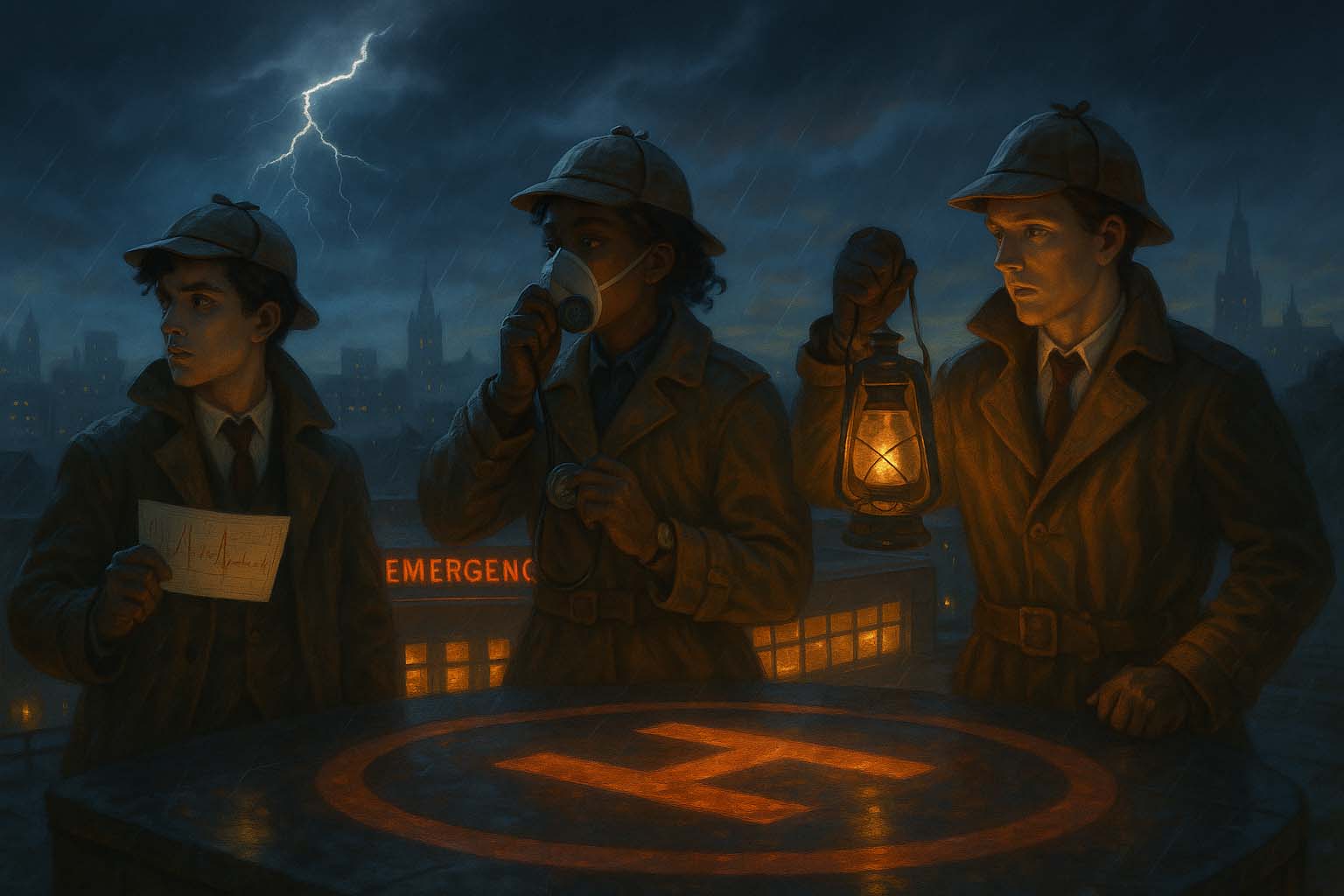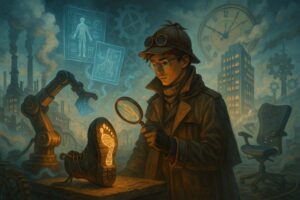
Emergency Medicine
- Posted by admin
- Categories Primary, Community & Continuity Care
- Date May 23, 2025
- Comments 0 comment
The First-Scene Detective’s Domain – Cracking the Cases of Collapse, Crisis, and Clarity in the Unknown
1. Introduction: The Scene of the Specialty
Step into the shoes of an Emergency Medicine sleuth.
This is the front line of medicine’s battlefield—the unfiltered arena where chest pain, trauma, overdose, and undifferentiated collapse all arrive at once. Emergency physicians don’t have luxury—they have instinct, systems, and speed. They stabilise the crashing, prioritise the waiting, and illuminate the unknown with structured chaos. Welcome to a world where you often know nothing but must decide everything, and where every second counts, even when the diagnosis doesn’t yet exist.
2. Key Mysteries They Solve (Common Presentations & Challenges)
These detectives specialise in solving cases involving:
- Chest Pain, Abdominal Pain, and Shortness of Breath – sorting life-threatening from benign in minutes.
- Trauma and Multi-System Injury – from motor vehicle accidents to falls and stabbings.
- Altered Mental Status and Seizures – diagnosing stroke, sepsis, toxidromes, or psychosis on the fly.
- Paediatric and Geriatric Emergencies – navigating atypical presentations at both ends of the age spectrum.
Each case demands decisive action—often before you even know the name of your patient.
3. Their Trusted Tools & Techniques
Every detective has their kit—and in Emergency Medicine, tools may include:
- Point-of-Care Ultrasound (POCUS) – a rapid window into internal bleeding, effusions, and cardiac activity.
- Airway Management & RSI – intubating the unresponsive, distressed, or deteriorating.
- Trauma Protocols and Triage Systems – applying ATLS, ACLS, and paediatric algorithms under pressure.
- Procedures from Chest Drains to Central Lines – done at speed, with skill, and often before the sun comes up.
This is fast, high-stakes medicine—where the clock is your greatest pressure and your sharpest ally.
4. The Charms of This Field: Why It Captivates the Curious
- No Two Days Alike: Every shift is unpredictable. You’ll never be bored—and never fully prepared.
- Broad Skillset: From ECGs to eclampsia, from trauma to toxicology, you touch every part of medicine.
- Instant Impact: Your decisions change outcomes—right now.
- Team Command: You lead resuscitations, coordinate disasters, and build rhythm into the rush.
This is the heart of acute care—where adrenaline meets assessment.
5. Challenges: The Toughest Cases They Face
- Diagnostic Uncertainty – You often treat before the full picture is known.
- Emotional Intensity – Delivering bad news, witnessing loss, managing violence or fear.
- Burnout Risk – Shift work, overcrowding, and moral injury are constant threats.
- System Pressure – Boarding patients, limited resources, and blurred boundaries with inpatient teams.
But the seasoned emergency physician knows: even when it’s hard, your presence makes the impossible possible.
6. Famous Cases and Hallmark Clues
- The “Classic Presentation” – Sudden-onset tearing chest pain radiating to the back: think aortic dissection.
- The “Zebra” – Confused diabetic with Kussmaul breathing and fruity smell: diabetic ketoacidosis (DKA).
- The “Aha Moment” – Subtle ST elevation in lead aVR with hypotension: critical left main coronary artery occlusion.
7. Your Training Trail: How to Join the Investigation
To become an Emergency Medicine detective:
- Train across all specialties—medicine, surgery, paediatrics, psychiatry, and trauma.
- Master resuscitation, rapid diagnostics, airway management, and procedural versatility.
- Develop calm communication and crisis leadership.
- Embrace uncertainty—this is medicine in motion, not medicine in waiting.
Whether you’re resuscitating a cardiac arrest, comforting a scared parent, or diagnosing sepsis before the labs return, you are the anchor in the storm.
8. Final Words: The Signature of the Emergency Medicine Detective
Emergency medicine detectives stand where the unknown arrives.
They hold the line when systems falter, stabilise the crashing, and clarify the chaos.
They are generalists, tacticians, teachers, and responders—there at the worst moments to deliver the best of care.
So if you’re drawn to immediacy, impact, and a career that keeps your heart racing—
then this is your front line, your fast lane, your forever challenge.



